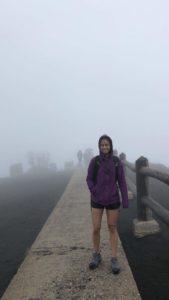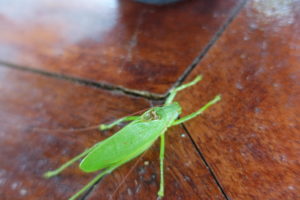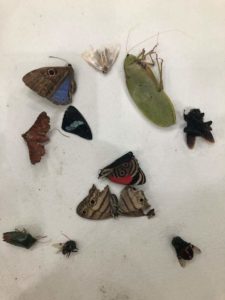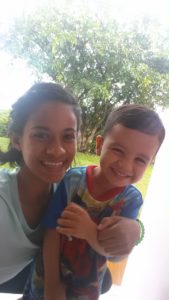 This blog post was written by Aliya during her 4th year in the Environmental Management stream.
This blog post was written by Aliya during her 4th year in the Environmental Management stream.
Every new experience comes with its own unique challenges. My time at the Las Nubes EcoCampus was amazing, but there were definitely some things my classmates and I could have been better prepared for. Below are my top 3 challenges and what you can do to be prepared for them.
The Rain
Save it for a rainy day they said! But in Costa Rica, every day is a rainy day. The majority of Costa Rica is a rainforest and so it’s going to rain and it’s going to rain a lot! Rainforests needs rain to survive as do all of the species that live there. The challenge is that the clouds would suddenly roll in (Las Nubes does mean the clouds). There would be times when I’d look out the window it would be bright and sunny, and then five minutes later it was white and I couldn’t see a tree in front of me.

Aliya wearing her rain jacket
I found it rained the most when I was in San José, but in the Alexander Skutch Biological corridor the rain was manageable...except for the transition day between the first and second course. There was a huge thunderstorm coming in and I remember our homestay abuela (Grandmother) asking us if we wanted to eat dinner outside or inside. At the time it was so sunny and hot, my friend and I decided to eat outside. As soon as we started to eat our dinner, a big roll of thunder came in, a lightning bolt struck not too far away from the house and me and my friend immediately screamed then started laughing. The thunder was so loud that it shook the table and our drinks almost spilled. It was so funny and definitely taught me about the unexpected rainfall Costa Rica can get.
However, I was fairly well prepared for the rain. I brought a raincoat from Mountain Warehouse before I left and it did the job just right for keeping me dry from the rain and allowing my skin to breathe in the heat and humidity. I did find that my hood was short, so I could have gone with a longer hood or some sort of rain hat to keep the water off from my face. If you want to avoid being wet, a lightweight raincoat and water resistant shoes should be good for the outdoor trekking.
The Bugs

Most of the time when we went out hiking, I wore a t-shirt or tank top with long pants. I rarely wore shorts because I know that mosquitoes love my blood and always want to bite me. No matter what though, you can’t escape the bugs and that’s okay because they are supposed to be there. The many different species of arachnids, insects, and other creepy crawlies are part of Costa Rica’s diverse ecosystem. I found that when I was complaining about the bugs and things that were bothering me, it was because it was natural and back home in Toronto we try so hard to make places unnatural that we lose sight of what was there in the first place before humans started developing the area. Even when I was all covered up and wearing bug spray, I found myself to always be swarmed by mosquitoes. So although I encourage you to be prepared with bug spray and long pants, bugs are also something you learn to deal with because they are a normal and necessary part of a rainforest.

I also learned that there are a lot of different species of ants in Costa Rica which I didn’t realize before I went. One time, during a snack break at the EcoCampus, I went to sit outside on the grass and I ended up sitting in an ants nest! I had to quickly run upstairs, rinse them off my body in the shower. They climb very fast! I had ants in my pants, my arms, my legs, I even found one in my armpit. But then again, I did sit on their home. My advice is taking note of your surroundings before sitting in an ants nest: They worked hard to build their home and are very territorial.
Language Barrier

Aliya and her homestay family
Last but not least, and certainly obvious, the language barrier was probably the biggest challenge I faced. Costa Rica is predominantly a Spanish speaking country, so if you know any bit of Spanish, you’re off to a good start! Environmental Studies did offer Spanish classes for week prior to the courses starting, however I did not attend them. Instead I downloaded a language learning app (Duolingo) and used a translator app that I could use offline (Google Translate) when I was in Costa Rica.
To avoid this, I could have attended the Spanish lessons offered in advance or spent more time learning Spanish before I left. However, even with my limited Spanish, I like to think I can communicate quite easily to people even without speaking their language. For the most part I used this method, but it was difficult when my homestay family was speaking to me so I had to resort to using the translator app. However, my trip did allow me to pick up a lot of Spanish and I came home singing all the popular Latin American songs to my friends and family.
I am so glad that I had the opportunity to go on the Semester Abroad, despite some of my challenges with the new experience. If I go back to the EcoCampus some day (which I intend to) I will be even more prepared and my experience will be that much better!

